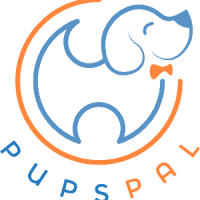It’s not uncommon to see dogs chewing their nails and paws, and it certainly is normal to see them perform self-grooming from time to time. However, if you notice that they repeatedly and excessively bite their nails, it usually is a sign of something’s bothering them. And that’s something you would want to keep an eye for and address it as soon as you can to prevent the issue from getting worse and becoming a chronic problem.
So, now the question is, why do canines bite their claws? Unfortunately, there’s no straightforward answer to this as there are many reasons why your four-legged friend would nibble on their feet. And below, we’ll talk about some of the possible causes of that strange nails and feet biting behavior.
1. It’s Time for a Grooming Session
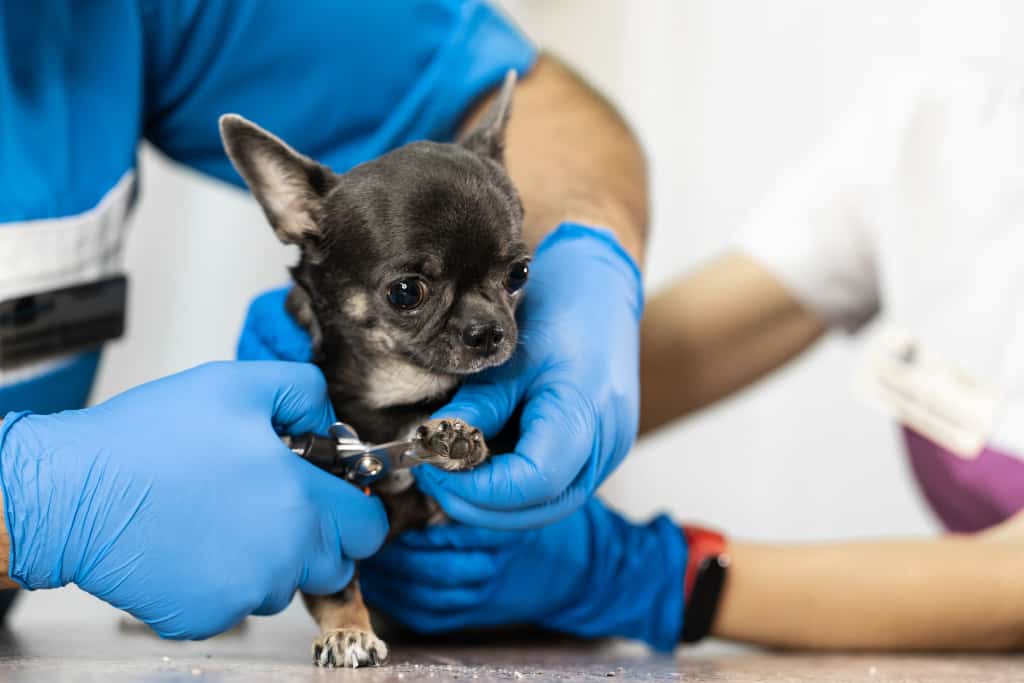
One of the most common reasons dogs would chew at their feet is simply because their nails are too long! When their claws are overgrown, it can put a lot of pressure on their nail beds and make it uncomfortable for them when they walk or run. Plus, their nails can become ingrow and dig into their skin and cause lots of discomforts, especially their dewclaw, which is their first digit that sits just above their weight-bearing joints.
How do I know when my dog’s nails are too long?
- You can hear the clicking sound when your dog walks on hard surfaces
- Significantly pawing on the ground, trying to grind their nails down
- They are scratching you when they paw at you
- Your pup seems to be walking gingerly, with their paws elevated and trying to avoid having their nails touched on the ground
- Nails curl over toward their paws
- Slide on the floor
Prevention:
- Trim your dog’s nails on a four to six weekly basis with either a nail grinder or nail clippers
- Visit a professional groomer instead if you are not confident in sanding down your dog’s claws yourself
2. Allergies
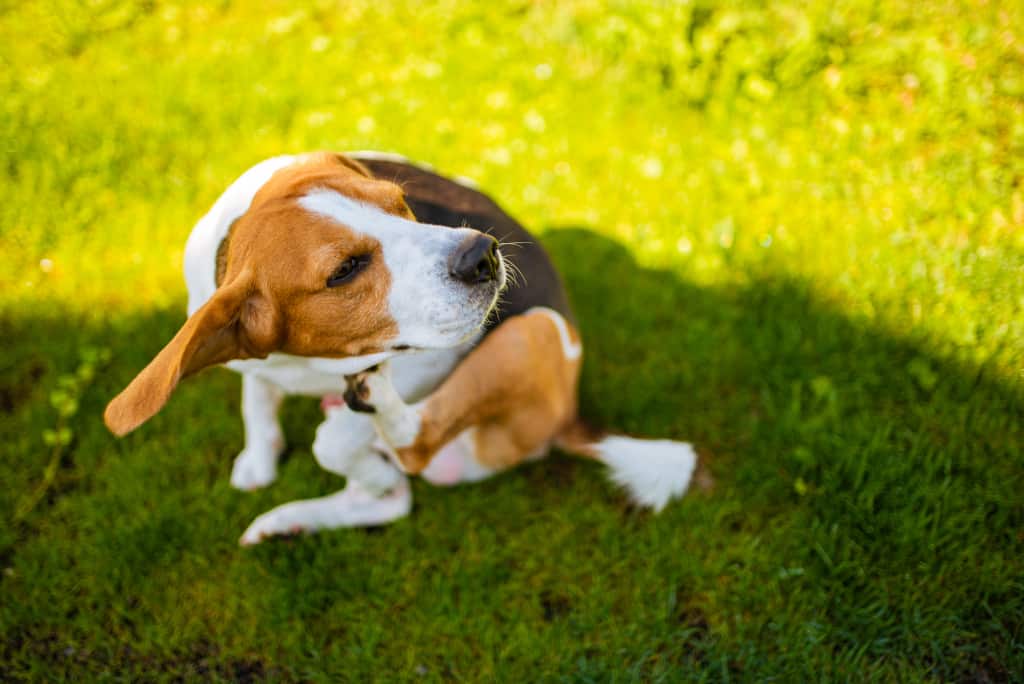
Another reason that could cause dogs to chew on their feet is skin allergies, also known as allergic dermatitis. It can cause itching, swelling, redness, or even loss of fur in the affected area and can be extremely uncomfortable for them. There are several types of skin allergies in dogs, and the main ones are food allergies, flea allergies, and environmental or seasonal allergies.
Signs of Allergies:
- Food Allergies: Like humans, dogs can develop an allergy to a particular food and trigger signs such as vomiting, diarrhea, hives, and itchiness. And according to the AKC, dog food allergies are unlike food sensitivities. Adverse food reactions (allergies) result from an immediate immunological response, in which the reaction will occur within seconds or minutes when dogs come into contact with the allergen. Food intolerances (sensitivities), on the other hand, are a more gradual reaction to the offending ingredients, for instance, chicken, eggs, and soy.
- Flea Allergies: Flea allergies or flea allergy dermatitis are an allergic reaction to fleabites. Dog’s body immune system will overreact when a flea bites them, causing itchiness, irritation, and hair loss, especially from the middle of the back to the base of their tails. It can occur with the presence, or previous presence of fleas, meaning even if you can’t see any flea on your dog, it is still possible that they have flea allergy dermatitis.
- Environmental or Seasonal Allergies: Dogs will also experience seasonal allergies, and you will only notice that during certain times of the year. It can lead to irritated eyes, sneezing repeatedly, and excessively scratching and licking. The allergens can include grass, pollen, mold spores, and dust mites.
Prevention:
For Food Allergies:
- Feed your dog hypoallergenic food
- Consult your veterinarian and put your pup on a proper feeding plan
For Flea Allergies:
- Use collars designed to repel and kill fleas
- Bathe your furkid routinely with medicated shampoos
- Consider spot-on flea and tick treatments
For Environmental or Seasonal Allergies:
- Frequently bathe your dog
- Give your dog’s body a quick wipe and clean their paws before they step inside the house
- Avoid walks in the early morning or late afternoon as that’s the time when allergens are highest
- Keep your home clean
- Supplement your fido’s diet with Omega 3
3. Tick Infestation
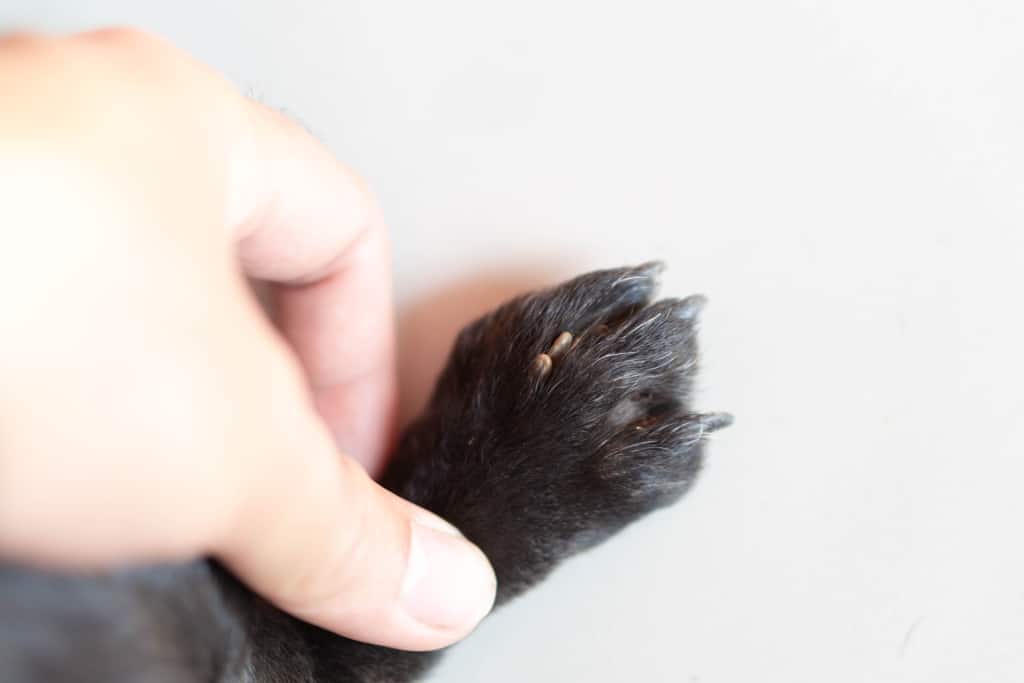
Not only can fleas cause itchy sensations, but also ticks! A tick infestation can cause dogs to constantly lick and nibble at their paws to relieve the discomfort. These little blood-sucking parasites love to hide in dark and warm areas, for instance, inside a dog’s groin area, between toes, on the eyelids, in and around the ears, and under the front legs. Ticks may also carry harmful diseases and can infect your canine with tick-borne infections. So, it is crucial to remove those pesky little insects as soon as you find one embedded in your dog’s skin.
Prevention:
- Check your four-legged friend for ticks after walks
- Get your dog to wear a flea and tick collar
- Give your pup tick baths
- Apply spot-on treatments
- Add apple cider vinegar and garlic to your fido’s meal
- Tick-proof your yard
4. Paw or Nail Injury
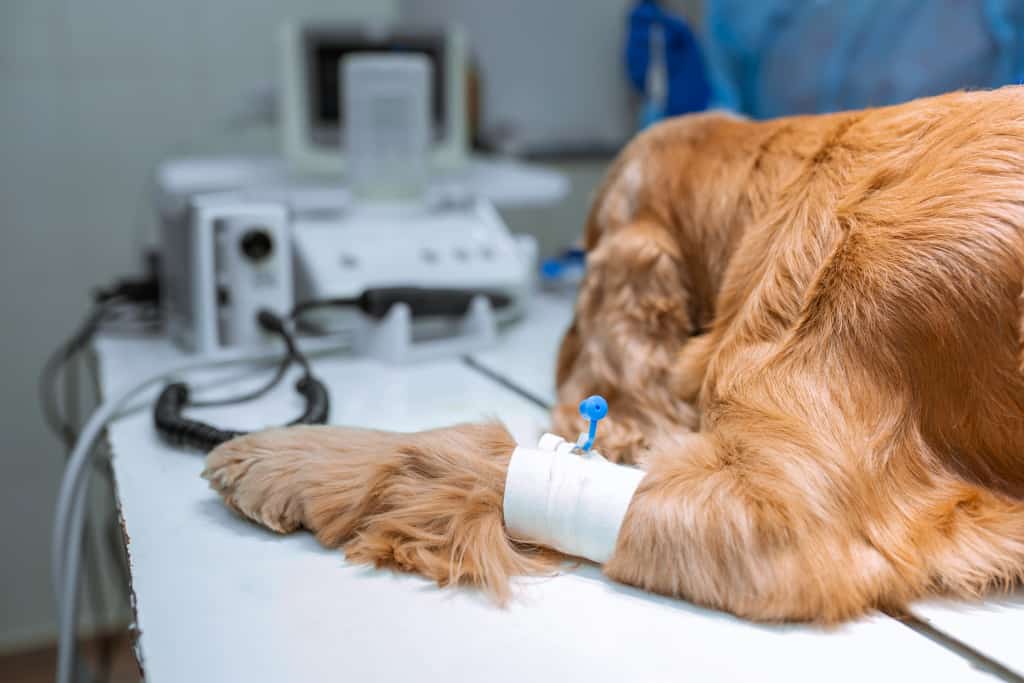
When you have a cut on your finger or any part of yourself, your first response would probably be sucking your bleeding wounds. Dogs are no different. When they have a nail injury or cracked paw pads, they would instinctively lick and chew at the damaged areas to soothe the pain. While licking can surely help cleanse the site of injury, their saliva contains bacteria, which can cause infections if introduced into the wound.
Things you can do before visiting the veterinarian:
- Remove tiny lodged particles with cool water
- Control the bleeding with a clean towel
- Wrap the wound with a bandage
Prevention:
- Put doggie footwear on your pooch when going out for walks
- Keep your dog’s paw pads moisturized during the colder months
5. Anxiety
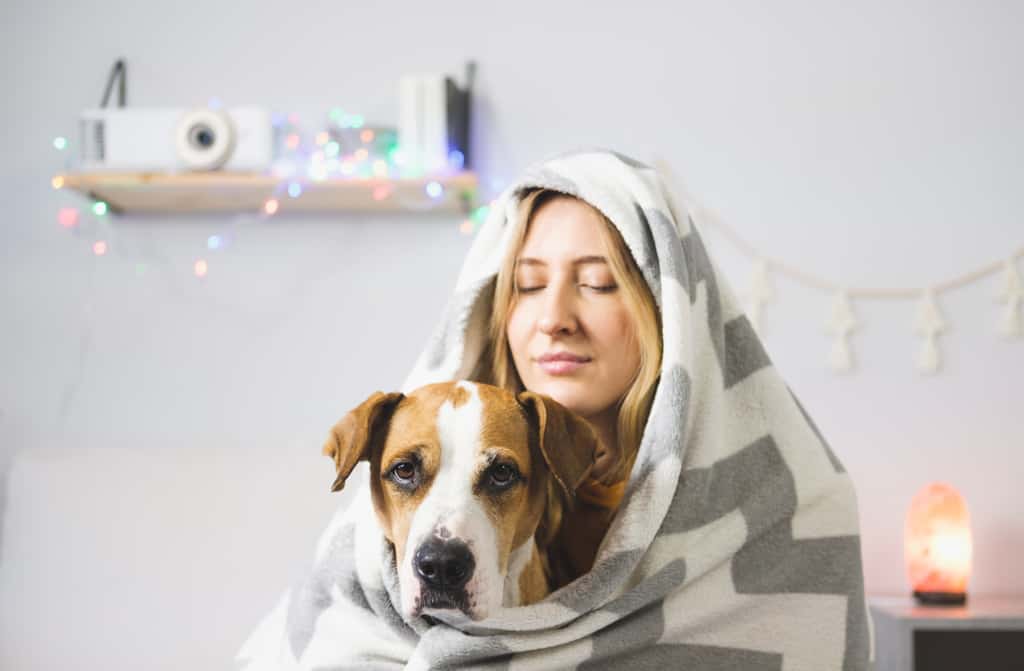
Just as we humans bite our nails when we are nervous, nail-biting could also be a sign that your dog is suffering from anxiety. There are many reasons dogs can become anxious. It could be due to the people or other animals around them, being left alone at home, vet visits, loud noises, or change in the environment.
What are the symptoms of canine anxiety?
- Urinating and defecating more frequently in the house
- Excessive barking and howling
- Whining
- Escaping
- Pacing
- Restlessness
- Panting (when it’s not hot)
- Shaking
- Drooling
- Yawning (when they are not tired)
- Destructive
How can I help my dog if they have anxiety?
- Provide your anxious pup with desensitization and counterconditioning training. Hire a professional dog trainer if you are unsure how
- Offer your dog stimulating chew toys as chewing is soothing for dogs
- Use scientifically proven dog calming collars to help your fido relax
- Give your dog anxiety medications, but make sure to speak to your veterinarian first before you do that
6. Mange
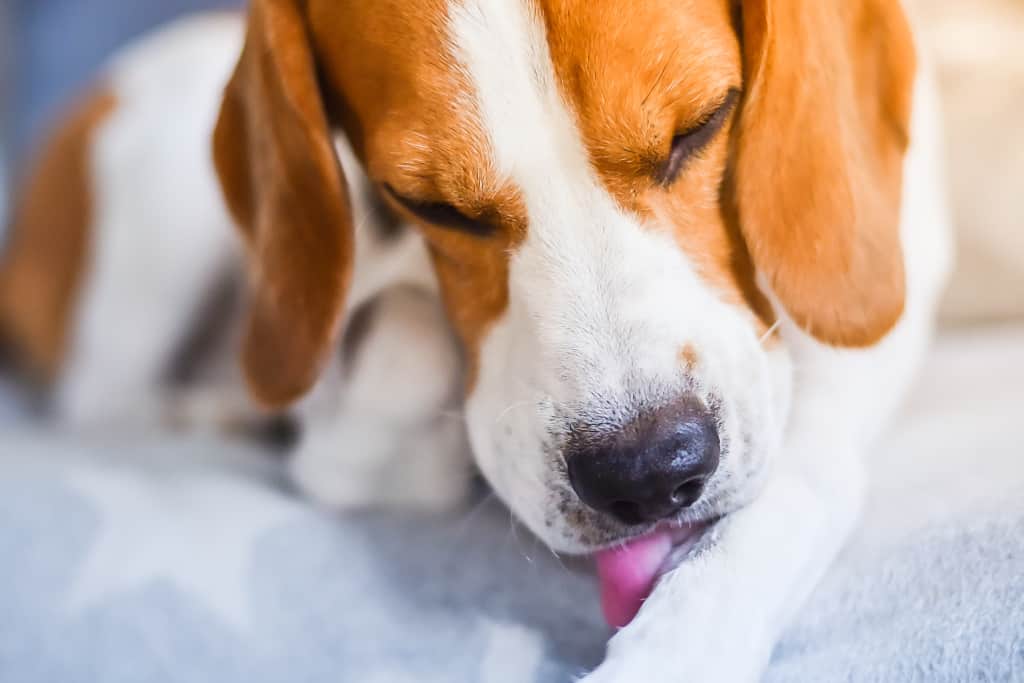
Another possible reason why dogs would chomp at their feet is because of mange. It is a severe skin condition caused by several species of mites. The two most common types of mange in dogs are demodectic mange (Demodex) and sarcoptic mange (Scabies).
The former tends to affect young puppies, senior dogs, and dogs with underlying conditions and can lead to patchy hair loss and red, scaling skin. The latter is an intensely itchy condition that can also affect humans. The symptoms include redness, scaling, crusts, and sores, especially on the abdomen, chest, legs, elbows, and ears.
Diagnosis:
- Your vet will take a piece of the skin scraping and observe it under a microscope to identify what kind of mites affect your furkid
Treatment:
- Once diagnosed, your vet will provide your dog with oral medications, injections, or a spot-on to resolve the infestation
- Wash your dog with an anti-parasitic shampoo
- Clip your fido’s hair
7. Skin Infections
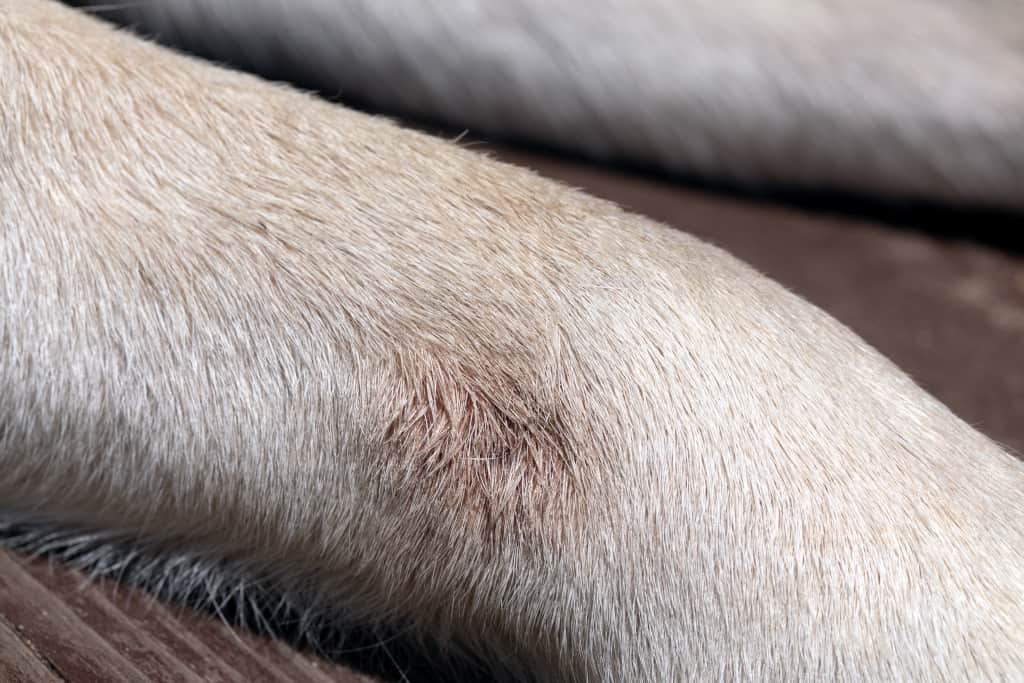
As we’ve mentioned earlier, dogs would intuitively lick and chew the wound following an injury to relieve the discomfort. Constant biting and licking would cause more damage to the affected area, making it more prone to dirt and debris, and as a result, leading to bacterial infections, which, in turn, leads to more chewing!
Prevention:
- Use an Elizabethan collar or a cone collar alternative to keep your dog from reaching the wound
8. Compulsive Disorders
If your furry friend comes out of the veterinary clinic with a clean bill of health, the chances are that they might have compulsive disorders, much like human obsessive-compulsive disorder (OCD). It is abnormal behavior in dogs that occurs repetitively and excessively, which can be challenging to diagnose and treat as dogs can develop compulsive disorders due to either one or a combination of genetic, stress, frustration, and underlying medical conditions.
How can I help my dog with compulsive disorders?
- Provide your pup with more physical and mental stimulation. For instance, take your canine on hikes or go jogging with them
- Avoid known stressors
- Speak to your veterinarian about medications
- Hire a dog behaviorist to help with behavior modification
Final Thoughts
If your canine chews and nibbles at their feet excessively, that means something is not right and is usually a sign of discomfort. So, make sure to try to get to the root cause as soon as possible to prevent your pup from making the existing problems worse.
Can’t seem to find why your dog bites their nails? Your best course of action would be to visit your trusted vet for professional advice, although the solution could be a simple task like trimming their nails or rinsing their feet before they step inside the house!

